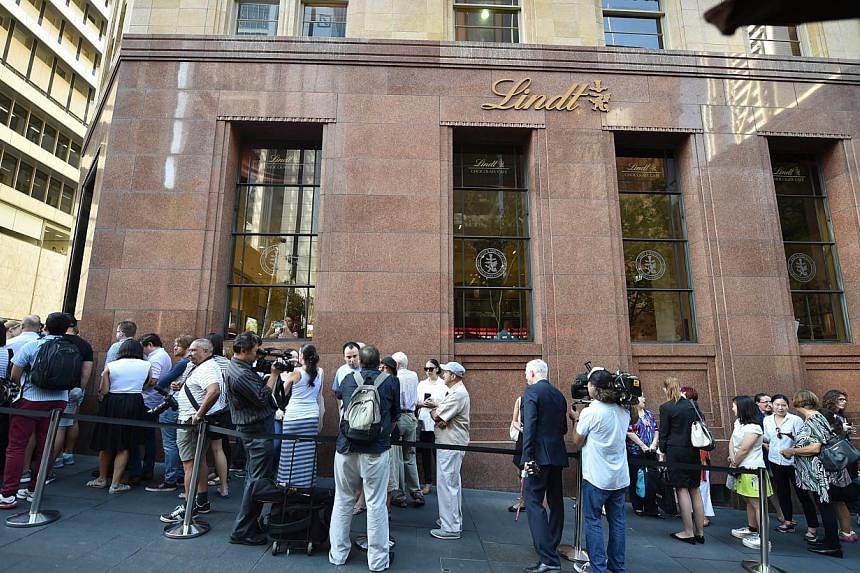SYDNEY (Reuters/AFP) - A self-styled sheikh who staged a siege at an Australian cafe last year suffered "grandiose delusions" and was once kicked out of a motorcycle gang because he was deemed so weird, an inquest into the deaths of three people heard on Monday.
Police stormed the Lindt Chocolate Cafe in central Sydney in the early hours of Dec 16 after Iranian-born gunman Man Haron Monis shot and killed 34-year-old cafe manager Tori Johnson with a sawn-off shotgun following a 17-hour stand-off. The inquest has already heard that one of the hostages taken by Monis, 38-year-old lawyer Katrina Dawson, was killed by a ricochet from at least one police bullet.
Monis, who was killed by the police, harboured deep grievances against the Australian government and claimed to be carrying out an attack as a member of the Islamic State in Iraq and Syria radical group.
However, far from belonging to a global movement, the inquest was told of his multiple failed attempts to cultivate a following not just within Sydney's mainstream Muslim community but anywhere that would accept him. "His constant goal in life appears to have been achieving significance," said Ms Sophie Callan, a lawyer assisting the inquiry.
At the reopening of the inquest, which began in January and is being held amid high security, New South Wales state coroner Michael Barnes said he would look deeply into the background of the former religious scholar and self-styled cleric.
He said the "despicable actions of Mr Monis", who took more than a dozen people hostage at the Lindt cafe in Martin Place, required special investigation because they raised questions of national significance.
"Was Monis a so-called lone wolf prosecuting an ISIS-inspired terrorist act, or was he a deranged individual pursuing some personal private grievance in a public manner?" he asked, referring to the Islamic State in Iraq and Syria.
The detailed inquest would examine whether Monis could have been deported, detained or stopped and whether the siege could have been ended without the loss of lives, Mr Barnes added.
The inquest will continue to examine Monis' biography, as well as looking into how he was on bail at the time of the siege despite facing charges relating to the murder of his former wife, who was found burnt to death in a Sydney apartment block.
The inquest was told that Monis was born into modest circumstances in Iran, but was well-educated and after his marriage had lived in relative luxury in the capital Teheran.
While his level of education could have led to a government job - and he boasted of high-level contacts - there was no evidence he had taken this path, said counsel assisting the coroner Jeremy Gormly.
"As we'll see, Mr Monis was prone to grandiose claims, but it seems that there may have been some kernel of truth in his background," Mr Gormly said.
The reasons why Monis quit Iran, arriving in Australia in 1996, are unknown. Making his case for asylum, he claimed that a book of his poetry had made him a target for persecution in Iran, and that he had spied for that country's secret police.
"He was secretive in many respects... yet he kept records dating back many years," Mr Gormly said, adding that Monis had lodged tax returns, reported changes of address and name and even filled out a form for police on staging a protest.
Monis struggled to find a place in Australia, working as a carpet salesman and security guard.
Between 2002 and 2007, Monis reinvented himself as a new-age guru or clairvoyant, marketing his "spiritual healing" techniques to female clients through advertisements in ethnic newspapers.
He was eventually charged with more than 50 counts of sexual and indecent assault as a result of his activities during that period, the inquest heard.
In 2012 or 2013, Monis unsuccessfully attempted to join the notorious Rebels Motorcycle Club, Ms Callan said. He was rejected because the biker gang thought that he was too "weird".
"Ultimately, he was rejected by the Rebels and they took his motorbike," she said.
Monis, who received Australian citizenship after claiming persecution, falsely claimed that his late father had been an ayatollah in Iran, lawyer Jeremy Gormly told the inquest.
Monis was found guilty in 2012 of sending threatening letters to the families of eight Australian soldiers killed in Afghanistan as a protest against Australia's involvement there, and was known to harass government employees.
By 2014, his constant reinventions had failed to pay off and his mental health was deteriorating.
"His attempt to develop a personal religious following...had failed. Indeed the Islamic community in Australia did not accept him," Mr Gormly said.
"He had few friends and no standing with any group or institution. His attempts to join other groups, even the bikies who tolerated him for a short period, failed."
Mr Gormly said that whether or not Monis expected to survive the events of Dec 15 and Dec 16 was not known, adding: "Reality for him, may not have hit home until many hours into the siege."
The inquest is being conducted across numerous sessions throughout the year with an outcome not expected until 2016.

